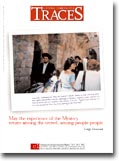
Traces N.9, October 2002
Where Peace BeginsThe world has always been marked by war–not only war between peoples and nations, but also the division that worms its way into the most “normal” relationships, into friendships and families. It seems that men are carriers of a disease impossible to stamp out. In many relationships, the time of unity runs out and is replaced by a state of tension, of war, whether it remains silent or bursts out.
In some moments in history, like the present one, everyone has the sensation that the destiny of the world lies in the hands of a few. There are episodes of grave international crisis that worry everyone deeply: the United States-Iraq, Israel-Palestine. And on the stage of history, it seems that very few determining protagonists remain. The world is turning toward these protagonists, hoping that, in them, the sense of peace may prevail over war.
But man’s heart, even the heart of those who have the fate of great decisions in their hands, is incapable of truly achieving peace.
This is because peace is a gift, it is something that man’s heart is not able to work out with its own strength. Experience teaches us that not even in the circumstances that are closest and most familiar to us (our workplaces, our homes, and our most intimate affections), is the most sincere desire for peace sufficient to achieve it. Much as it is desired as a liberation, it appears as a distant ideal, almost a dream.
Peace is perceived as a gift that is indeed achieved through the hearts and actions of men, through the commitment of human freedom, but it comes from somewhere else. This is because the protagonist of peace, the Lord of peace, is God. Therefore, the most realistic action in these times, as the Pope reminds us, is prayer–prayer like a child’s–that God may ensure peace, vanquishing enmity. And Fr Giussani, speaking recently to 15,000 CL adults in Milan, said, “Let us live prayer as the first outpost of the battle in our life.”
War begins right where men no longer acknowledge God as the protagonist-builder of history. In His place, as the criterion and horizon with which to judge relationships and problems, they put something else. And in the changing name of this “something else”–power, money, ideology, utility, or a comfortable life–they begin to hate and can even tear each other apart.
The man who prays is the first builder of peace, because he acknowledges that God, Being, is the mover of life, is the ultimate criterion for action, both in joy and in pain and sacrifice. Peace begins with this acknowledgment, which generates–as the first concrete characteristic of action–hope, indomitable hope. This is not a virtue of the cowardly, but of people in the daily struggle for existence, who are thrown back by hope into action for peace, with greater awareness and responsibility.
Only if they start from this are the human heart and the sense of responsibility moved to gestures that transcend the terrible, inevitable logic of war–gestures that are performed, even when it would seem impossible, in international relationships just as in everyday ones. This issue of Traces offers documentation, among other things, of encounters that were unthinkable but are real, with figures of Judaism and Islam, which are already the beginning of a peace that is not indifferent tolerance, but is active participation in the destiny of the other.